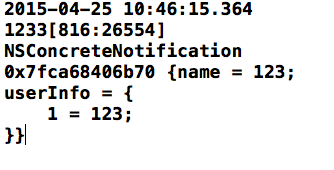标签:
这个类可以理解为一个消息对象,其中有三个成员变量。
这个成员变量是这个消息对象的唯一标识,用于辨别消息对象。
@property (readonly, copy) NSString *name;
这个成员变量定义一个对象,可以理解为针对某一个对象的消息。
@property (readonly, retain) id object;
这个成员变量是一个字典,可以用其来进行传值。
@property (readonly, copy) NSDictionary *userInfo;
NSNotification的初始化方法:
- (instancetype)initWithName:(NSString *)name object:(id)object userInfo:(NSDictionary *)userInfo;
+ (instancetype)notificationWithName:(NSString *)aName object:(id)anObject;
+ (instancetype)notificationWithName:(NSString *)aName object:(id)anObject userInfo:(NSDictionary *)aUserInfo;
注意:官方文档有明确的说明,不可以使用init进行初始化
这个类是一个通知中心,使用单例设计,每个应用程序都会有一个默认的通知中心。用于调度通知的发送的接受。
添加一个观察者,可以为它指定一个方法,名字和对象。接受到通知时,执行方法。
- (void)addObserver:(id)observer selector:(SEL)aSelector name:(NSString *)aName object:(id)anObject;
发送通知消息的方法
- (void)postNotification:(NSNotification *)notification;
- (void)postNotificationName:(NSString *)aName object:(id)anObject;
- (void)postNotificationName:(NSString *)aName object:(id)anObject userInfo:(NSDictionary *)aUserInfo;
移除观察者的方法
- (void)removeObserver:(id)observer;
- (void)removeObserver:(id)observer name:(NSString *)aName object:(id)anObject;
几点注意:
1、如果发送的通知指定了object对象,那么观察者接收的通知设置的object对象与其一样,才会接收到通知,但是接收通知如果将这个参数设置为了nil,则会接收一切通知。
2、观察者的SEL函数指针可以有一个参数,参数就是发送的死奥西对象本身,可以通过这个参数取到消息对象的userInfo,实现传值。
首先,我们在需要接收通知的地方注册观察者,比如:
//获取通知中心单例对象 NSNotificationCenter * center = [NSNotificationCenter defaultCenter]; //添加当前类对象为一个观察者,name和object设置为nil,表示接收一切通知 [center addObserver:self selector:@selector(notice:) name:@"123" object:nil];
之后,在我们需要时发送通知消息
//创建一个消息对象
NSNotification * notice = [NSNotification notificationWithName:@"123" object:nil userInfo:@{@"1":@"123"}];
//发送消息
[[NSNotificationCenter defaultCenter]postNotification:notice];
我们可以在回调的函数中取到userInfo内容,如下:
-(void)notice:(id)sender{
NSLog(@"%@",sender);
}
打印结果如下:

疏漏之处 欢迎指正
学习使用 欢迎转载
IOS中通知中心(NSNotificationCenter)的使用总结
标签:
原文地址:http://my.oschina.net/u/2340880/blog/406163